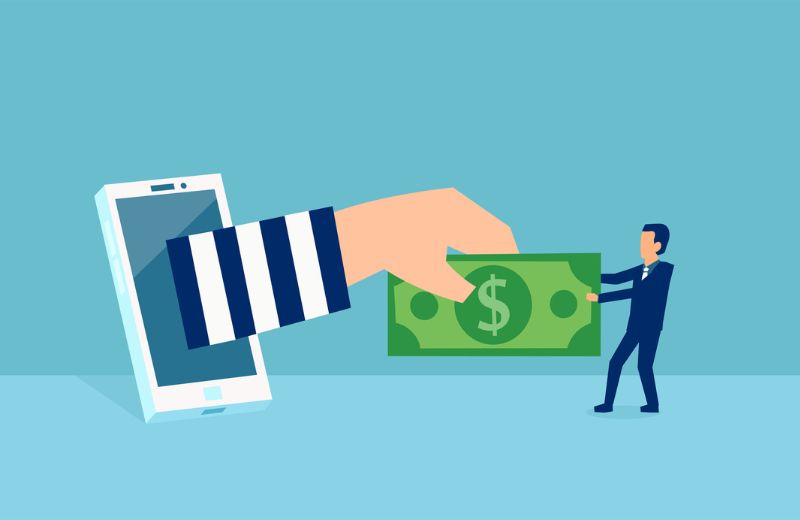not featured
2025-05-30
5/30/2025
Fraud
published
%20(25).jpg)
How to Recognize and Avoid Zelle Scams
If you already use the payment app Zelle, you probably love the convenience of instantly sending and receiving money between your checking account and anyone else’s. However, every great technological advance also comes with the potential for fraud. In 2022, Zelle users lost over $250 million to scams in 2022. With millions of people using Zelle to transfer billions of dollars each year, it’s important to learn how to avoid Zelle scams. In this article, we’ll walk you through what Zelle is, how it works, and the most common Zelle scams to recognize.
What is Zelle?
Like Venmo and Cash App, Zelle is a peer-to-peer (P2P) money transfer app. You can download the Zelle app or use it within your mobile banking app (we all get tired of downloading another app, right?).
So, whether you’re paying the babysitter to watch the kids on date night or paying back your buddies for some takeout, sending money with Zelle® means never having to download another app.
How does Zelle work?
With Zelle, you can move money from your bank account to any other bank account. Pay the babysitter, pay back a friend after dinner, send birthday money to a niece or nephew, and so on.
It’s easy to get started with Zelle–simply sign up with your email address or mobile phone number. To send money to someone else, you just need to enter the email address or mobile number of the recipient. They will get a notification telling them how to complete the payment.
It’s important to note that Zelle only works with U.S. bank personal banking accounts.
Is it convenient?
Zelle is the only P2P app that doesn’t charge a fee for instant money transfers. You can transfer Zelle funds into your bank account in minutes. And you can send money to friends and family whether they bank at the same place as you or not.
Remember that your bank will never ask for your full account number, debit card number, social security number, or other sensitive information.
10 Common Zelle Scams
Unfortunately, every new technology comes with people who try to take advantage of the opportunity to scam others. Zelle is no exception–here are the most common scams to watch out for.
1. Fake Messages From Your Bank
This falls into the category of a phishing scam. The sender impersonates your financial institution in a text message or email, asking you to approve or deny a recent Zelle payment. Usually, they try to get you to click on a malicious link or disclose sensitive information.
Remember that your bank will never ask for your full account number, debit card number, social security number, or other sensitive information. Before clicking on a URL or responding to the message, contact your bank directly through the customer service number listed on their website. If you are a CS Bank customer, you can call us at (479) 253-2265 to inquire about any messages you receive. You can also use our free CS Bank Card Manager mobile app to set up debit card alerts, turn your card on or off, and submit travel notices. Simply visit your app store and search for "CS Bank Card Manager" to download now.
2. Account Takeover Scams
In this scam, someone else gets access to your Zelle account, likely from a phishing message, and changes the password so that you’re locked out. Unfortunately, Zelle, is still connected your checking account, so the scammer can transfer your money to their own bank account.
To avoid a takeover of your Zelle account, only enter your login credentials on the official Zelle app or website. When sending money to friends and family, send a microtransaction such as $1.00 first to ensure the money reaches your intended recipient before making a larger transfer.
3. Transfers To Yourself
It’s not just fake texts and emails that you need to watch out for. Some scammers will go as far as to call you and pretend to be from your bank, stating that your account has been compromised and a fraudulent transaction made, so you need to transfer the money back to yourself
With Caller ID spoofing, scammers can make the caller ID look like it’s coming from your bank. They will tell you go into your Zelle app and reverse an unauthorized transaction. You do this by entering a code, typing your first and last name, and putting “reversal” in the memo.
However, you are actually sending money to the scammer, not reversing an unauthorized transaction. As with phishing messages, if you get suspicious calls like this, hang up and call your bank directly.
4. Pay a Friend Scams
With this scam, you get a fake request that looks like it’s from one of your friends–with the same profile picture, though the username may be off. Scammers will try to add urgency to this unexpected request to get you to approve it without looking too closely.
Always double check the username to make sure it’s correct. It’s also a good idea to contact your friend outside of Zelle to confirm the request if it’s not something you were expecting.
5. Fake Puppy Scams
While this type of scam has been declining, still the total cost of pet scams exceeded $2 million last year, according to the Better Business Bureau. Puppy scams make up a large part of this total, with the Yorkie, Dachshund, and French Bulldog breeds especially ripe for scams.
With a fake puppy scam, you respond to an online listing for an animal that doesn’t actually exist. You transfer money to the purported breeder, but never get your pet.
In addition to the loss of money, it’s heartbreaking to get attached to a puppy, only to find out it wasn’t real. You can protect yourself by:
- Seeing the puppy in-person before you pay anything
- If an in-person visit isn’t possible, you should at least have a video call
- Conducting a reverse image search on the photos in the ad
- Researching the average market price for the breed you’re interested in
- Remember that animal shelters and rescue organizations usually take the adoption fee in person as they’re handing over the pet. So, be wary of a so-called shelter that asks you to Zelle them money.
6. Facebook Marketplace Scams
Facebook Marketplace is a great tool for selling your unwanted items, but you have to be wary of scams. This one works like this:
The scammer reaches out hours after the listing goes up to ask if the item is still available. They claim to be a senior citizen who is not very tech savvy, so they ask for your phone number and email address to send you money via Zelle. Then you receive a phishing email from a Zelle-like email address prompting you to enter your login credentials or upgrade to a business account.
Remember that you don’t need a commercial Zelle account to send and receive money. When buying or selling something online, it may be best to keep it cash-only or at least only complete the Zelle transaction at pick up of the item.
The scammer reaches out hours after the listing goes up to ask if the item is still available. They claim to be a senior citizen who is not very tech savvy, so they ask for your phone number and email address to send you money via Zelle. Then you receive a phishing email from a Zelle-like email address prompting you to enter your login credentials or upgrade to a business account.
Remember that you don’t need a commercial Zelle account to send and receive money. When buying or selling something online, it may be best to keep it cash-only or at least only complete the Zelle transaction at pick up of the item.
7. Rental Scams
If you’re looking to rent an apartment or house, you may inadvertently fall victim to a rental scam. These are especially common on Craigslist, but it can also happen on Facebook. Scammers use real photos from real estate listings to create a fake rental advertisement. With rising rents and a supply of rental housing that doesn’t meet all the demand, you may feel pressure to put money down before you see the place in person. Rental scams prey on this by listing a rent that’s a little lower than market or choosing photos that make the space look amazing for the price.
To avoid rental scams, always insist on seeing the unit in person before you pay anything, even an application fee. If a listing seems too good to be true, it probably is.
8. Money Mule Scams
This type of scam involves receiving money that was derived from fraud and then moving it for the scammer. You may not even know you’re being used in this way. The most common Money Mule Scams include:
- Debt Collector Scam: The scammer pretends to be a debt collector and threatens legal action if you don’t pay them using Zelle.
- Contest Winner Scams: Scammers tell you that you won a contest, but you need to send money first to receive your prize.
9. Remote Job Scams
You apply online for a job, but the posting is fake. You are hired and told you need to send money for your equipment, such as a laptop. Remember that a legitimate employer will always pay for training, equipment, and other costs associated with starting a new job.
10. Romance Scams
With the popularity of online dating, people can meet and fall in love over the phone even if they don’t live in the same place. Unfortunately, this also makes romance scams possible. You think you’re in a committed long-distance relationship, so you don’t think twice when your sweetheart says they need money and asks you to send funds over Zelle to help them cover a medical bill or other unexpected expense.
The only way to avoid a romance scam is to never send money to a paramour you haven’t met in person yet. You can also do a reverse search with the person’s profile pic. Romance scammers may pose as someone else’s real identity.
Other payment app scams
Of course, online payment scams aren’t exclusive to Zelle. Scams can also unfold on other payment apps like Venmo and Cash App. For example, #CashAppFriday and #SuperCashAppFriday are legitimate giveaways, but scammers also impersonate these legitimate contests to defraud you with a giveaway scam. And scammers have used Venmo to perpetuate pyramid schemes that promise to “turn $100 into $800.”
Just as with the rest of the Internet, anyone who can communicate online and send or receive payments can be a target for scammers. Follow common cybersecurity tips, as well as your gut instincts, to protect yourself, your identity, and your finances.
CS Bank is committed to helping you stay safe online!
CS Bank will never ask for your personal or financial information via text, email, or phone call. You can always contact us at (479) 253-2265 with questions or concerns about your account or any messages you receive that appear to be from us. Or visit any of our branch locations in Northwest Arkansas and Southwest Missouri. You can also use our free CS Bank Card Manager mobile app to set up debit card alerts, turn your card on or off, and submit travel notices. Simply visit your app store and search for "CS Bank Card Manager" to download now. Read more about CS Bank's commitment to fighting bank fraud.
To report a lost or stolen debit card, contact any CS Bank location during regular business hours (Monday — Friday, 8:00 a.m. to 5:00 p.m. CT). For after-hours assistance, please call (800) 383-8000. To report a lost or stolen credit card, please call TCM Bank, N.A. at (866)-572-1637.
CS Bank’s online banking services are completely private and confidential. Your unique ID, Password and 2-Factor Authentication are required before any information about your account can be obtained. In addition, all data is automatically encrypted. You can be confident your data is treated with the utmost security. Learn more about how to stay safe online by checking out these 5 ways to prevent bank fraud and how to protect yourself from cybersecurity threats. More information about scams can also be found on the FBI’s website and Zelle’s Fraud page.


